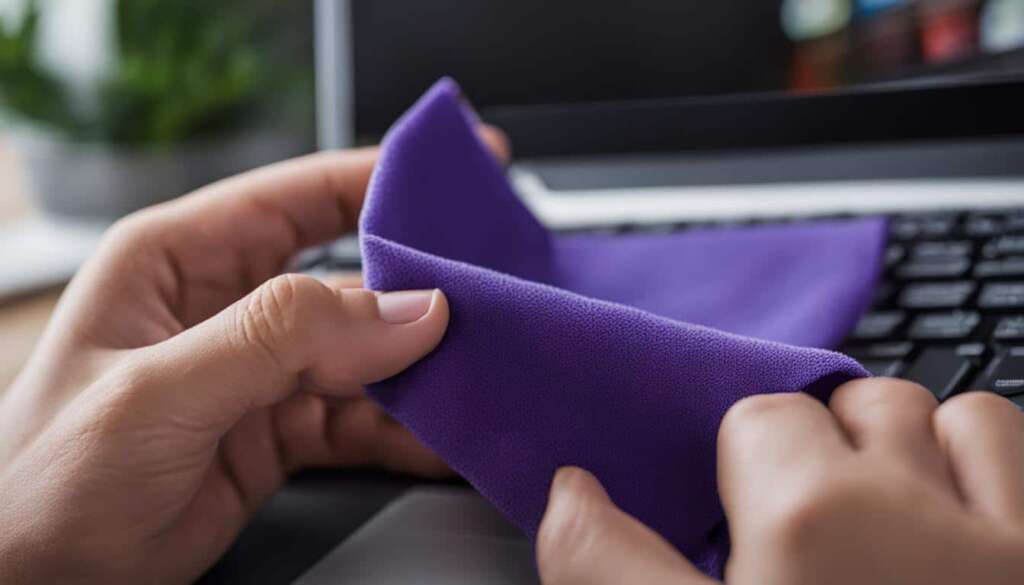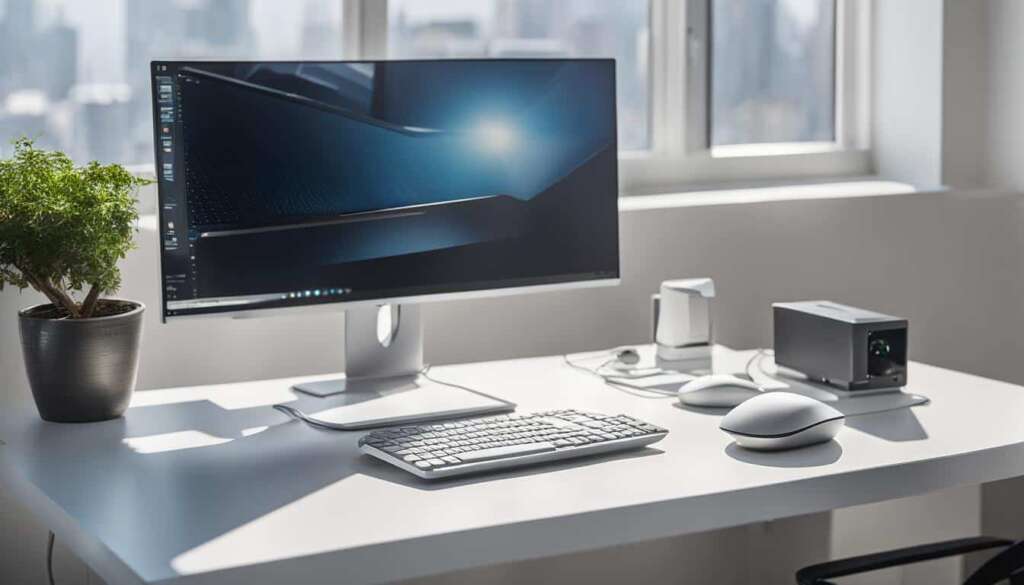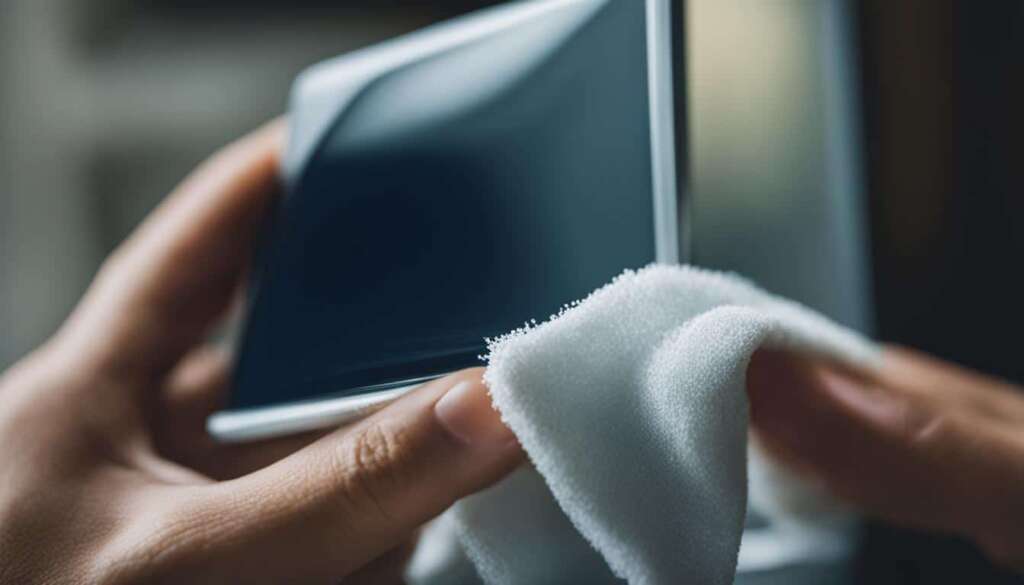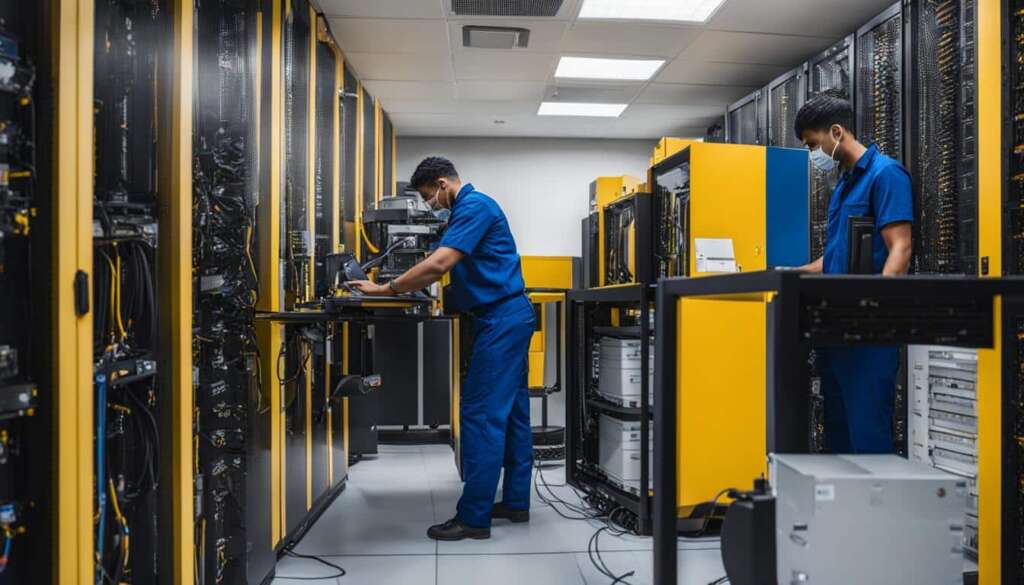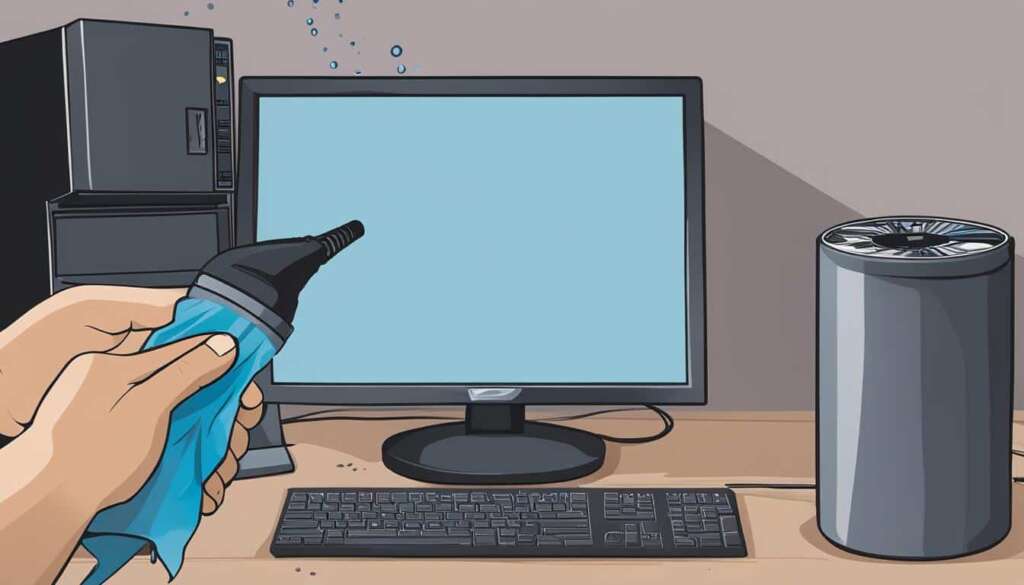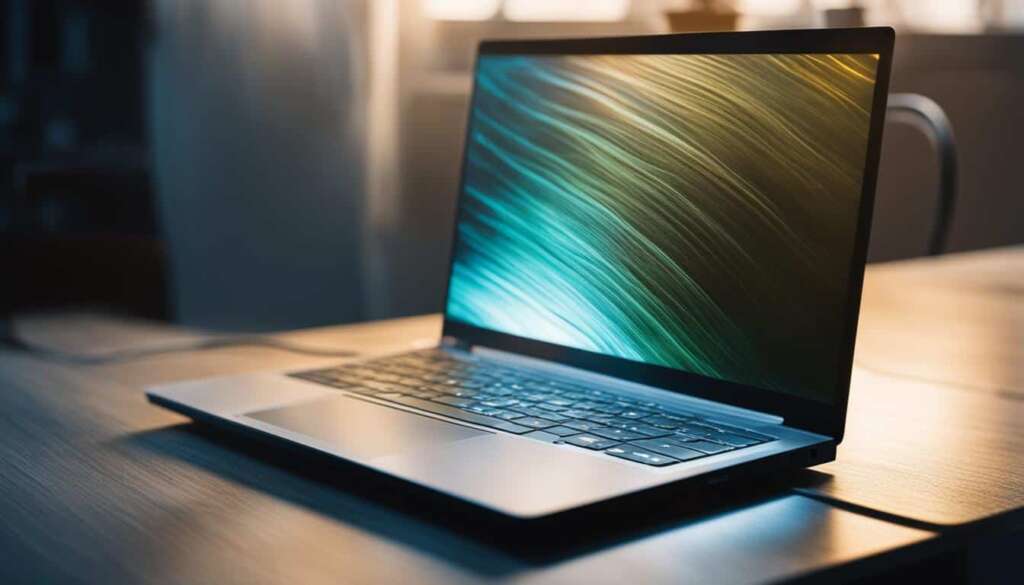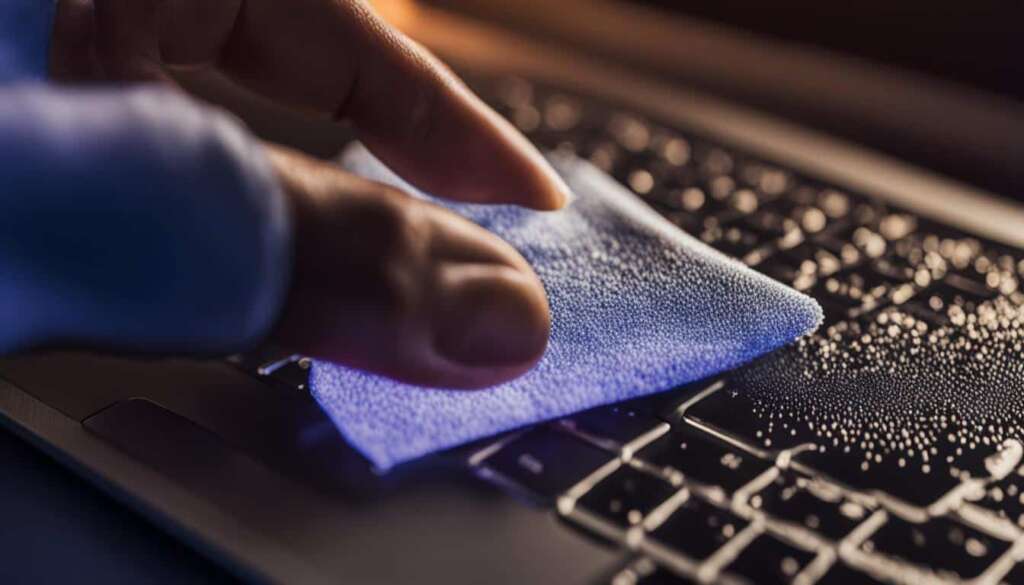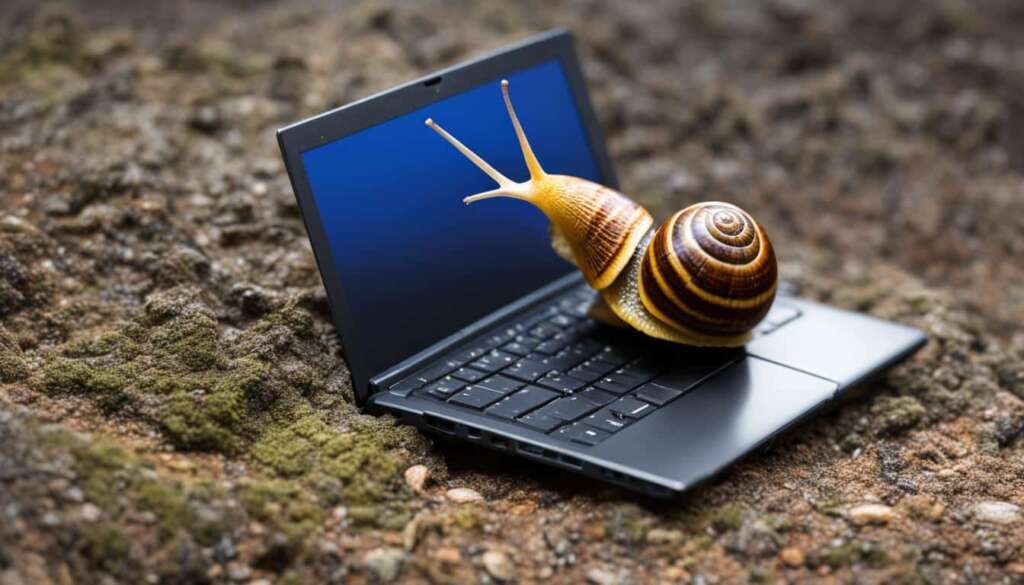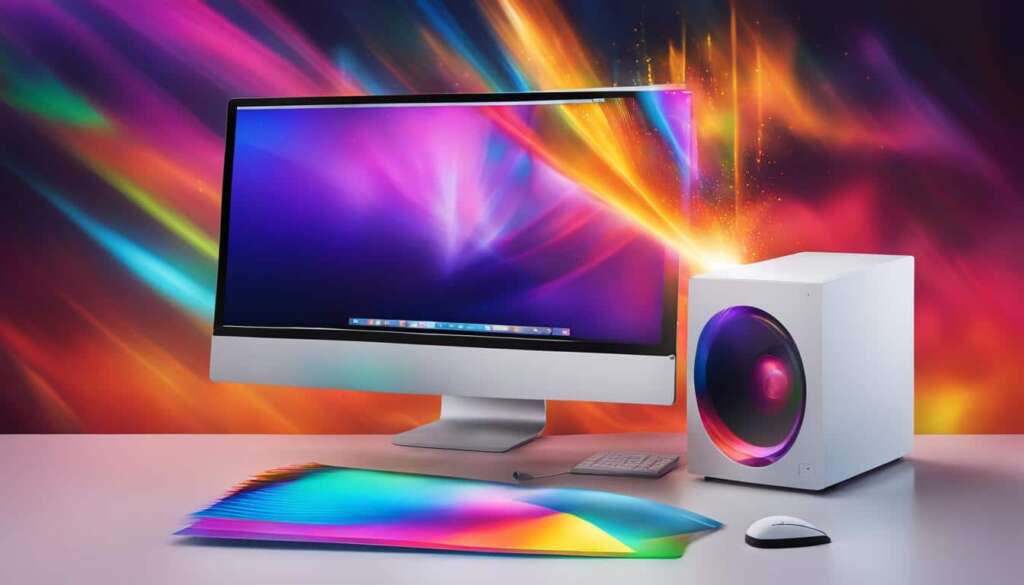Table of Contents
Cleaning your computer screen is essential for maintaining its performance and display quality. Over time, dirt, debris, and smudges can accumulate and impact the clarity and longevity of the screen. However, with the right techniques and cleaning agents, you can effectively clean your computer screen without causing any damage.
Key Takeaways:
- Regularly cleaning your computer screen helps maintain optimal performance and display quality.
- Using appropriate cleaning agents and techniques is crucial to prevent damage to the screen.
- Know the type of screen you have and follow the manufacturer’s cleaning guidelines.
- Avoid using harsh cleaning materials like vinegar or alcohol and exerting excessive pressure while cleaning.
- Cleaning both the inside and outside components of your computer is important for overall performance and longevity.
Why is Cleaning Your Computer Screen Important?
Regularly cleaning your computer screen is of utmost importance to ensure optimal performance and longevity of your device. The accumulation of dirt, debris, and smudges on the screen can have various negative effects that impact both the visual quality and functionality of your computer.
Firstly, dirt and debris can obstruct the display, resulting in reduced clarity and visibility. This can make it difficult to read text, view images, and navigate through your computer’s interface. By cleaning your screen regularly, you can maintain a clear and crisp display, allowing for a more enjoyable and productive computing experience.
In addition to visual issues, dirt and debris can also clog the connection ports and cooling vents of your computer. This can lead to overheating, which can cause system performance issues and potentially damage the internal components. By cleaning your screen, you can prevent the buildup of dust and ensure proper airflow, helping to maintain optimal temperature and performance.
Regularly cleaning your computer screen is essential for maintaining its performance and display quality.
Benefits of Regular Screen Cleaning
- Enhanced visual experience: Clean screens offer a sharper and more vibrant display, allowing you to fully appreciate the graphics and colors of your favorite games, movies, and images.
- Improved productivity: A clean and clear screen makes it easier to read text, view documents, and perform tasks efficiently. This can enhance your productivity and reduce eye strain during long hours of computer use.
- Extended screen lifespan: By removing dirt and smudges that can cause scratches and damage, regular screen cleaning helps extend the lifespan of your computer screen. This can save you money in the long run by avoiding the need for costly screen replacements.
- Prevention of health issues: Unclean screens can harbor bacteria and allergens, potentially leading to health issues such as eye infections and respiratory problems. Regular cleaning helps maintain a hygienic environment and promotes a healthier computing experience.
Table: Impact of Dirt on Computer Screen
| Issue | Impact |
|---|---|
| Reduced visibility | Difficult to read text or view images |
| Overheating | Can cause system performance issues and potential damage |
| Scratches and damage | Shortens screen lifespan and may require costly repairs |
| Health hazards | Bacteria and allergen buildup can lead to infections and respiratory problems |
Regularly cleaning your computer screen not only enhances the visual experience and productivity but also extends the screen’s lifespan while preventing potential health issues. By keeping your screen clean and free from dirt and debris, you can enjoy a clear and functional display, optimal performance, and a healthier computing environment.
Dos and Don’ts for Cleaning Your Computer Screen
When it comes to cleaning your computer screen, it’s important to follow the dos and don’ts to ensure safe and effective cleaning. By knowing the proper techniques, you can maintain the clarity and longevity of your screen without causing any damage.
Dos
- Know the type of screen you have: Different screens may require different cleaning methods. Check the manufacturer’s guidelines to determine the best approach for your specific screen.
- Read the manufacturer’s cleaning guidelines: These guidelines will provide you with valuable information about the recommended cleaning agents and techniques.
- Shut down the computer before cleaning: This will prevent any accidental damage and ensure your safety.
- Use a small quantity of appropriate cleaning agent: Apply the cleaning agent to a clean microfiber cloth and gently wipe the screen using a circular motion.
Don’ts
- Wipe the screen with paper towels or rags: These materials can scratch the screen and leave behind lint.
- Use harsh cleaning materials like vinegar or alcohol: These substances can damage the protective coating on the screen.
- Apply excessive cleaning liquid: Too much liquid can seep into the screen and cause internal damage.
- Spray liquid directly on the screen: Direct spraying can lead to liquid entering the device and causing malfunctions.
- Exert pressure while cleaning: Apply light pressure to avoid damaging the screen or dislodging any internal components.
By following these dos and don’ts, you can safely clean your computer screen and keep it looking pristine. Remember to always refer to the manufacturer’s guidelines and use gentle cleaning techniques to maintain the performance and longevity of your screen.
| Dos | Don’ts |
|---|---|
| Know the type of screen you have | Wipe the screen with paper towels or rags |
| Read the manufacturer’s cleaning guidelines | Use harsh cleaning materials like vinegar or alcohol |
| Shut down the computer before cleaning | Apply excessive cleaning liquid |
| Use a small quantity of appropriate cleaning agent | Spray liquid directly on the screen |
| Exert pressure while cleaning |
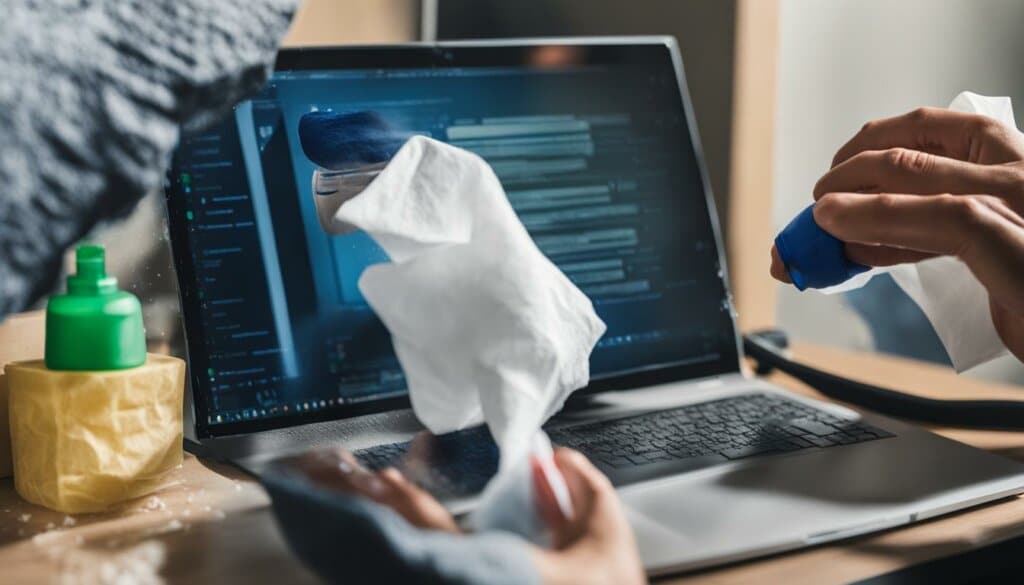
Summary
When cleaning your computer screen, remember to follow the dos and don’ts for safe and effective cleaning. Dos include knowing the type of screen, reading the manufacturer’s cleaning guidelines, shutting down the computer, and using a small quantity of appropriate cleaning agent applied to a clean microfiber cloth. Don’ts include wiping the screen with paper towels or rags, using harsh cleaning materials, applying excessive cleaning liquid, spraying liquid directly on the screen, and exerting pressure while cleaning. By following these guidelines, you can maintain the clarity and longevity of your computer screen.
How to Clean an LCD Computer Screen
When it comes to cleaning an LCD computer screen, it’s important to take the right approach to avoid causing any damage. Here are the steps you can follow to safely clean your LCD screen:
- Gently shut down your computer and unplug it from the power source.
- Use a soft, microfiber cloth to gently wipe the screen in a vertical or horizontal motion to remove any loose dust or particles.
- If there are any stubborn stains or smudges, you can use a dedicated LCD cleaning spray or create a homemade solution by mixing distilled water with a small amount of gentle dish soap.
- Spray the cleaning solution onto the microfiber cloth and avoid spraying it directly onto the screen.
- Gently wipe the screen using the dampened cloth, making sure to remove any stains or fingerprints.
- After cleaning, use a dry microfiber cloth to gently dry the screen and remove any remaining cleaning solution.
It’s essential to ensure that the screen is completely dry before turning on your computer again. This helps prevent any potential damage that could occur if moisture remains on the screen.
Remember to always follow the manufacturer’s guidelines and recommendations for cleaning your specific LCD screen. If you’re unsure about any aspect of the cleaning process, it’s best to consult the user manual or contact the manufacturer for guidance.
| Cleaning Steps for LCD Screens | Cleaning Solutions for LCD Screens |
|---|---|
| Shut down and unplug the computer | Use a dedicated LCD cleaning spray |
| Gently wipe the screen with a microfiber cloth | Create a homemade solution with distilled water and gentle dish soap |
| Apply the cleaning solution to the cloth | Avoid spraying the solution directly on the screen |
| Wipe the screen to remove stains or smudges | |
| Dry the screen with a dry microfiber cloth |
Cleaning your LCD computer screen regularly not only helps to maintain its performance and display quality but also ensures a clear and enjoyable viewing experience.
How to Clean a Non-LCD Computer Screen
Cleaning a non-LCD computer screen, such as a MacBook screen with glass coating, requires a slightly different approach. To effectively clean a non-LCD screen, you can use mild cleaning agents like white vinegar or diluted alcohol in addition to distilled water. The following are the steps for cleaning a non-LCD screen:
- Turn off the device to avoid any potential damage.
- Wipe away dust and loose particles from the screen using a clean microfiber cloth. Be gentle to prevent scratching the surface.
- Mix a small amount of cleaning agent with distilled water. For example, you can dilute white vinegar or alcohol in a 1:1 ratio with water.
- Apply a small amount of the cleaning solution onto a clean cloth. Ensure that the cloth is damp, not wet, to avoid excess liquid coming into contact with the screen.
- Gently wipe the screen using the damp cloth, focusing on areas with fingerprints or smudges. Be careful not to press too hard to avoid damaging the screen.
- After cleaning, use a dry microfiber cloth to wipe the screen again, removing any remaining cleaning solution and ensuring a streak-free finish.
It is important to allow the screen to air dry completely before using the device again. This will help prevent any damage caused by moisture. By following these steps, you can effectively clean a non-LCD computer screen and maintain its appearance and performance.
Table: Cleaning Solutions for Non-LCD Screens
| Cleaning Solution | Benefits |
|---|---|
| White vinegar diluted with water | Effectively removes fingerprints and smudges |
| Diluted alcohol | Safe for use on glass coatings, helps remove tough stains |
| Distilled water | Gentle and safe for regular screen cleaning |
Remember to always refer to your device’s manufacturer guidelines for specific cleaning instructions, as some screens may have unique requirements. Regularly cleaning your non-LCD computer screen will help keep it looking clear and vibrant, ensuring an optimal viewing experience.
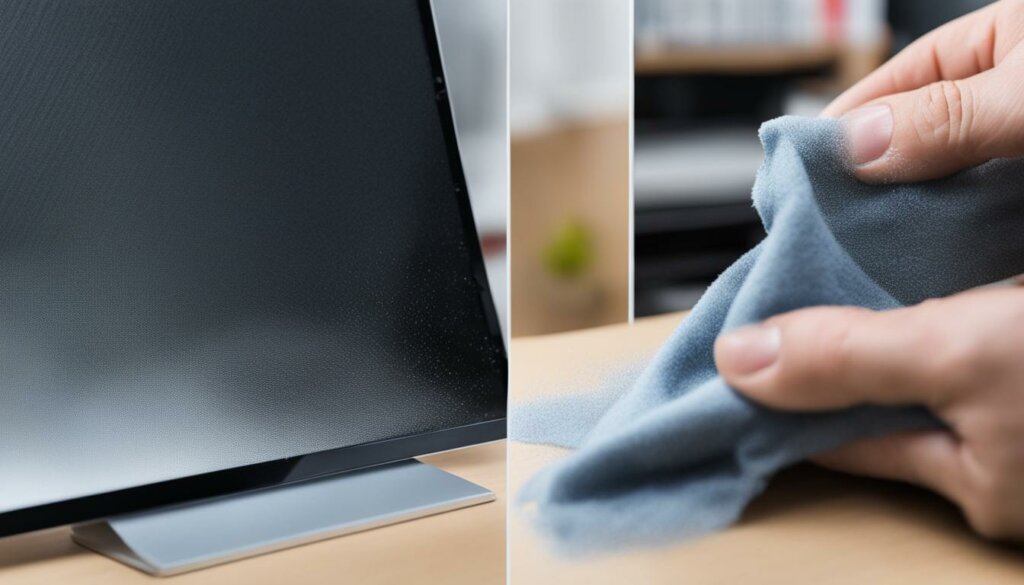
Tools and Tips for Cleaning Your Computer Screen
Properly cleaning your computer screen requires the right tools and techniques to ensure effective and safe results. Here are some essential tools and valuable tips to help you maintain a clean and clear computer screen:
Tools for Cleaning
- Clean microfiber cloth: This soft and lint-free cloth is ideal for removing dust, fingerprints, and smudges from your screen. It is gentle enough not to scratch the surface.
- Compressed air: Use compressed air to blow away dust and debris from hard-to-reach areas, such as keyboard crevices and ports. Ensure you hold the can upright and follow the manufacturer’s instructions.
- Mini vacuum/blower: An alternative to compressed air, a mini vacuum or blower can effectively remove dust and dirt from your computer screen and other components.
- Distilled water: For a homemade cleaning solution, mix distilled water with a small amount of white vinegar or isopropyl alcohol. Avoid tap water as it may leave mineral deposits on your screen.
Tips for Effective Screen Cleaning
- Gentle circular motion: When cleaning your computer screen, use a gentle circular motion to avoid putting excess pressure on the screen. This helps to prevent damage and ensure an even clean.
- Avoid spraying cleaning agents directly on the screen: Instead, apply the cleaning solution onto the microfiber cloth and then clean the screen. Spraying directly on the screen can lead to liquid seeping into the device.
- Be cautious with liquid: Use a minimal amount of cleaning solution or distilled water to dampen the cloth. Excessive liquid can damage the screen or seep into the internal components.
By using the right tools and following these tips, you can effectively clean your computer screen and maintain its performance and longevity. Regular cleaning will help remove dirt, smudges, and fingerprints, resulting in a clear and enjoyable viewing experience.
| Tool | Advantages |
|---|---|
| Clean microfiber cloth | – Soft and lint-free – Gentle on the screen – Effective for dust and smudge removal |
| Compressed air | – Blows away dust and debris – Reaches hard-to-clean areas – Quick and efficient |
| Mini vacuum/blower | – Removes dust and dirt – Versatile for various components – Prevents accumulation of debris |
| Distilled water | – Suitable for homemade cleaning solution – Minimizes the risk of mineral deposits – Safe for screens |

“Gentle cleaning with the right tools and techniques can prolong the life of your computer screen and enhance your overall computing experience.”
Importance of Cleaning Your Computer Inside and Out
Cleaning your computer’s hardware, including the screen, is crucial for maintaining optimal performance and longevity. While cleaning the digital aspects of your PC improves performance, preventing dust buildup and keeping the physical components clean help speed up the device and prevent overheating. Regular maintenance should extend beyond just cleaning the computer screen to include other components such as the fan and hard drive, ensuring smooth operation.
Dust accumulation can impede airflow, causing components to overheat and potentially leading to system crashes or hardware failures. Cleaning the inside of your computer involves removing dust from fans, heat sinks, and other components using compressed air, a mini vacuum/blower, or anti-static brushes. Regularly cleaning the inside helps maintain proper air circulation and prevents the system from running hot, thereby improving its performance and longevity.
Aside from the internal components, keeping the external parts of your computer clean is equally important. Dust and dirt can accumulate on the keyboard, ports, and vents, affecting both the appearance and functionality of the device. It is recommended to use compressed air or a soft brush to remove dust from the keyboard, ports, and vents. Additionally, wiping the exterior surfaces with a microfiber cloth or a mild cleaning agent can help maintain a clean and presentable appearance.
| Benefits of Cleaning Your Computer Inside and Out |
|---|
| Improved system performance |
| Prevention of overheating |
| Reduced risk of hardware failures |
| Enhanced airflow and ventilation |
| Extended device lifespan |
Regularly cleaning your computer inside and out not only ensures optimal performance but also contributes to its longevity. By preventing dust buildup and maintaining proper air circulation, you can minimize the risk of overheating and hardware failures. With improved system performance and extended lifespan, your computer will continue to serve you smoothly and reliably for years to come.
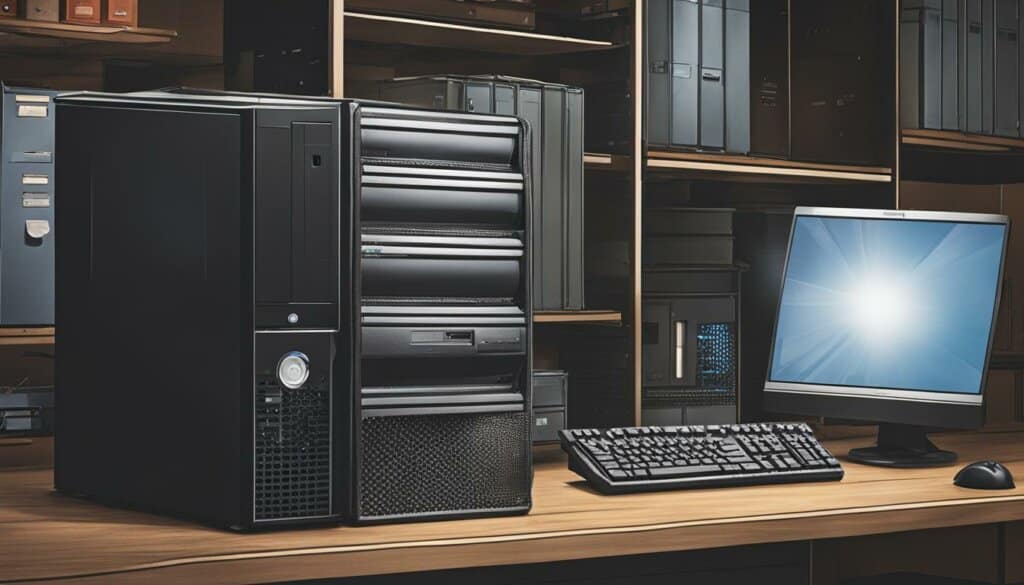
Conclusion
In conclusion, regular maintenance and cleaning of your computer screen are crucial for ensuring optimal performance and longevity. By following the dos and don’ts of screen cleaning and using appropriate cleaning agents, you can keep your screen clean and free from dirt, debris, and smudges that can affect its clarity and display quality.
It is important to incorporate screen cleaning into your regular maintenance routine to prevent issues such as reduced display quality, clogged connection ports, and overheating. By taking care of your computer screen, you can enjoy a faster, more efficient, and long-lasting device.
Remember, cleaning the screen is just one part of maintaining your computer’s overall performance. It is recommended to also clean other hardware components, including the fan and hard drive, to ensure smooth operation. By keeping your computer clean inside and out, you can enhance its performance and prolong its lifespan.
So, make screen cleaning and regular maintenance a priority to experience a clean and clear computing experience. By taking care of your computer screen, you can enjoy optimal performance and longevity in the long run.
FAQ
Why is it important to clean your computer screen?
Cleaning your computer screen is essential to maintain its performance and display quality. Regular cleaning helps remove dirt, debris, and smudges that can accumulate over time and impact the clarity and longevity of the screen.
What are the dos and don’ts for cleaning a computer screen?
Dos include knowing the type of screen you have, reading the manufacturer’s cleaning guidelines, shutting down the computer before cleaning, and using a small quantity of appropriate cleaning agent applied to a clean microfiber cloth. Don’ts include wiping the screen with paper towels or rags, using harsh cleaning materials like vinegar or alcohol, applying excessive cleaning liquid, spraying liquid directly on the screen, and exerting pressure while cleaning.
How do I clean an LCD computer screen?
To clean an LCD screen, use a clean microfiber cloth and a dedicated LCD spray or a homemade solution of distilled water. Shut down the system, gently wipe the screen with a dry microfiber cloth to remove dust, apply the cleaning spray on the cloth (not directly on the screen), and clean the screen in an up-and-down or side-to-side motion to remove stains and smudges. Allow the screen to completely dry before using it again.
How do I clean a non-LCD computer screen?
For non-LCD screens like those with glass coating, use mild cleaning agents like white vinegar or diluted alcohol in addition to distilled water. Turn off the device, wipe away dust with a microfiber cloth, apply a small amount of cleaning agent on a clean cloth, gently wipe the screen to remove fingerprints or smudges, and finally wipe the screen with a dry cloth to eliminate streaks. Ensure the screen is completely dry before using the device.
What tools and tips are recommended for cleaning a computer screen?
Recommended tools include a clean microfiber cloth, compressed air for dusting, a mini vacuum/blower as an alternative to compressed air, and distilled water for a homemade cleaning solution. Tips include using a gentle circular motion, avoiding spraying cleaning agents directly on the screen, and being cautious about the amount of liquid used.
Why is it important to clean your computer inside and out?
Cleaning the hardware components of your computer, including the screen, is important for maintaining optimal performance and longevity. Preventing dust buildup and keeping the physical components clean helps speed up the device and prevent overheating.

